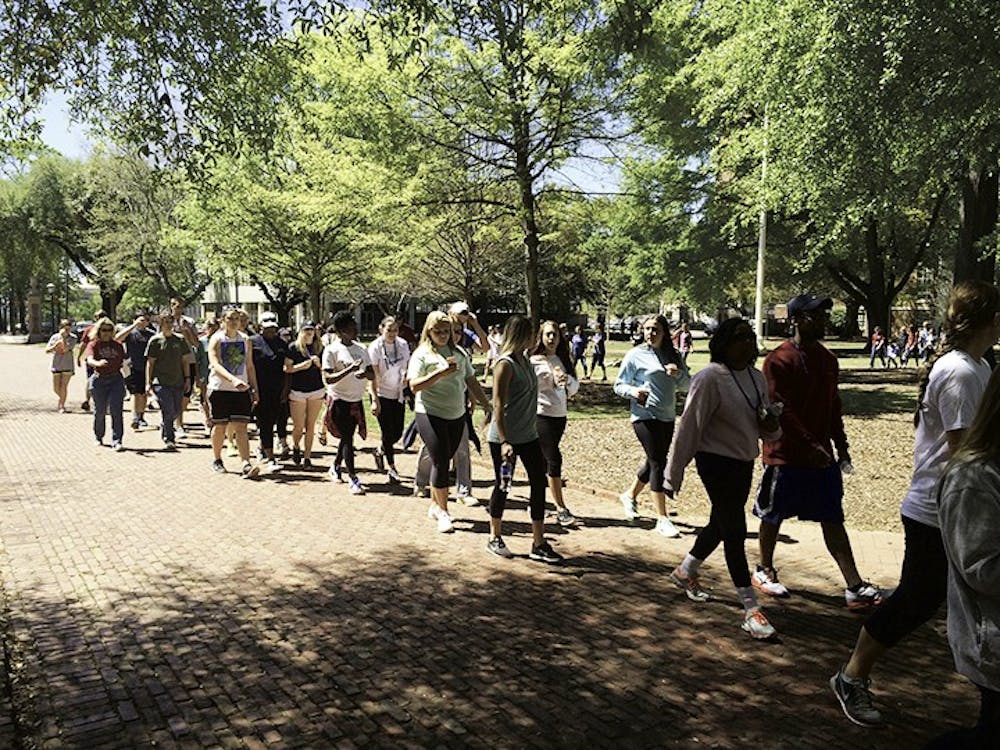A small horde of students, family and friends marched around campus Sunday afternoon for the fourth annual Out of the Darkness suicide prevention walk.
The Out of the Darkness program, which hosts campus and community walks, is a branch of the American Foundation for Suicide Prevention. The 187 participants registered for USC's walk managed to raise over $14,000 for AFSP.
Fourth-year history student Mallory Suggs served as 2016 walk chair and has been involved since the first walk her freshman year. That year, she was only a participant and then moved up to the planning committee the next two years.
Suggs shared her own struggle with depression and spoke about how her friends and family managed to pull her out of that dark time in her life. She said that the resources provided by the university are incredibly helpful, but she thinks that a student organization would be the next step towards furthering suicide prevention and awareness.
"We would focus solely on suicide prevention ... and getting information out there, learning the warning signs of suicide, that sort of thing," Suggs said.
The process of establishing a student organization through AFSP is in the works and hopefully will become a reality by this upcoming fall semester.
"I know that there's a lot of support for it," Suggs said. "This walk has grown exponentially this year, and it's been amazing, and we need to keep that momentum going."
The event opened with Suggs' story and a few brief remarks. One of the opening speakers was Rebecca Caldwell, the director of Strategic Health Services for Healthy Carolina. Caldwell said that her experience with depression and suicide, through her father, gave her an understanding of how to implement suicide prevention at Carolina.
"We must take care of each other, spend extra time with each other and reach out to resources," she said. "And one of the absolute best ways that we can blot out the darkness is not only just being there for other, but to practice self-care every day."
Another of the opening speakers was Student Body President Michael Parks, who briefly discussed the new Student Government initiative of peer listeners, which will begin this upcoming fall.
"This will be a program that allows students to listen to other students who are going through problems, students who are considering suicide or even going through a depressed time in their life," he said.
Parks also briefly referenced a new campaign aimed at mental health and suicide prevention whose slogan is "Be real, Be there," and encourages students to be involved in the mental wellness of themselves and their friends.
"Always assume that you are the only one who will reach out," he said. "One suicide attempt is one suicide attempt too many."
The route of the walk traced the outside of the Horseshoe, took Pendleton, Senate and Barnwell streets down to Capstone and cut back to and around the Horseshoe again, ending where it had begun at Currell College. After the walk itself was over, Helen Pridgen, AFSP South Carolina area director, gave her remarks on the event and offered her thanks to the committee and the volunteers.
Pridgen discussed her own loss from suicide and encouraged others who had lost loved ones to try to learn from them.
"They may not be here physically, but they are here in spirit," she said. "What was it about them? What is something that you want to carry on with you?"
Another of her messages was the hope and spirit that she saw in the walk's volunteers. She particularly commended the men in the crowd, insisting that their voices must also be heard in suicide prevention.
"I believe that your generation is going to change the world," Pridgen said, "you bring hope to me as I look out at all of you."
One faculty member whom others recognized throughout their remarks was Jennifer Myers, the assistant director for Campus Mental Health Initiatives and coordinator of Suicide Prevention Services. Myers has worked at USC for almost five years and has always been involved with suicide prevention. USC appealed to her because it is one of the only universities that has a position and department dedicated specifically to that cause.
The university has largely expanded its mental health programs during Myers' time at Carolina, but she continues to look for new and better ways to spread information and awareness. She discussed the Student Government peer listening program and its potential to increase communication between students.
"It's just another safe place," she said. "You just might need some advice or someone to listen, about stress or relationships, some of those day-to-day things that we might face."
She also discussed the "Be Real, Be There" campaign, whose goal is to get students to talk to each other openly and honestly. Many people who struggle with depression or who have lost someone to suicide feel that they have to deal with it alone, but Myers stressed that this is not the case.
"There's hope. You're not alone," she said. "We're here for you, other students are here for you, people in our community are here for you. And it's okay to reach out to a friend, to someone you trust and to the counseling center."

